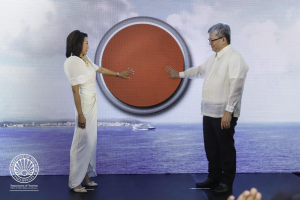The Philippines has further solidified its status as a premier cruise tourism destination as it proudly received the prestigious Best Ports of Call 2024 award at the 10th Asia Cruise Awards, held during the Asia Cruise Forum in Jeju Island, Korea.
According to Department of Tourism (DOT) Secretary Christina Garcia Frasco, the award highlights the efforts of cruise tourism stakeholders in revitalizing the country’s cruise industry post-pandemic, driven by the Marcos administration’s prioritization of tourism.
“Under the National Tourism Development Plan (NTDP) 2023-2028 approved by President Ferdinand R. Marcos, Jr., the Department of Tourism has identified Cruise Tourism as one of the strategic products capable of attracting large regional markets. With 7,641 islands, there is immense potential in further expanding the cruise tourism portfolio in the Philippines, and that is why the effort is to collaborate with our partners from the national and local government units, private sector stakeholders, and destinations to expand our cruise tourism offerings, and to work with our counterpart national government agencies in liberalizing policies, with the ultimate goal of making it easier and more convenient for more cruises to call on the country,” Secretary Frasco said.
In a ceremonial awarding of the recent cruise citation held during the launch of the Cruise Visa Waiver (CVW) Program on Tuesday (July 16) at the TIEZA Multi-Purpose Hall, Secretary Frasco added, “These accolades reaffirm our vision and validate our efforts in positioning our country as a must-visit destination for cruise enthusiasts.”
The annual Asia Cruise Forum in Jeju provides a platform for cruise industry stakeholders to collaborate on creating a competitive advantage for Asia in the cruise tourism landscape. The Asia Cruise Awards, celebrated during the Asia Cruise Forum, honors excellence across various sectors of the cruise industry. Other awards presented at the ceremony include Asia’s Best Cruise Ship, Asia’s Best Cruise Homeport, and Special Achievement Awards.
Awardees are selected by the Asia Cruise Leaders’ Network (ACLN), which comprises 74 member organizations from nine countries, and in which the Philippines is currently an observer. As may be recalled, the country also bagged the Asia’s Best Cruise Destination award during the prestigious World Cruise Awards 2023.
Launching of Cruise Visa Waiver Program to boost cruise tourism
In its effort to strengthen the country’s cruise tourism portfolio, the DOT, in partnership with the Department of Justice (DOJ) and the Bureau of Immigration (BI), has launched the Cruise Visa Waiver (CVW) Program. The initiative aims to streamline visa processes and attract more international cruise ships to the country, further solidifying the Philippines’ status as a premier cruise destination in Asia. The program is an outcome of the DOT Secretary’s listening tour convergence meeting with the DOJ and the BI and has been identified as a priority concern by travel and tourism stakeholders during the meeting.
During the launch, Tourism Secretary Christina Garcia Frasco highlighted the importance of the CVW Program in promoting convenience and accessibility for cruise tourists. “It is imperative for us to fully harness the potential of our destinations, as well as to open up opportunities to all of our region’s provinces, cities, and municipalities. Therefore, the cruise visa waiver program allowing the Philippines to become more accessible, welcoming, and attractive to the world is a welcome initiative,” the Tourism Chief enthused.
The CVW Program provides a fast and convenient means for visa-required cruise tourists to visit the Philippines. Eligible tourists must arrive and depart via cruise ship, be handled by a BI-accredited cruise tour operator, and hold a passport valid for at least six months from their arrival date. The program is expected to increase the number of cruise ship arrivals, contributing to the DOT’s goal of boosting foreign tourist arrivals and enhancing the overall tourism experience aligned with the National Cruise Tourism Development Strategy and Action Plan.
Secretary Frasco also highlighted the country’s remarkable tourism growth, which underscores the growing appeal of the Philippines as a cruise destination. For 2024, 117 port calls are anticipated by the Department. Additionally, the Philippines supplies nearly 70,000 cruise crew and hospitality workers globally, reinforcing its significant role in the cruise industry.
DOJ Assistant Secretary Majken Anika Gran-Ong likewise pledged the Department’s support for the program, stating, “We demonstrate our commitment in facilitating seamless travel experiences. As visa-required nationals onboard cruise ship vessels arriving in the Philippines will now be able to have a faster and more convenient means of securing an entry visa. This program is of great significance to our country’s tourism, immigration, and economic sectors and is expected to be a catalyst of economic vitality, cultural exchange, and enhanced global connectivity.”
“The Cruise Visa Waiver is more than just a policy change. It is a testament to the government’s proactive approach to economic transformation. This initiative, which allows visa-required nationals vacationing on board cruise ships to enter the Philippines more conveniently, is a major leap towards achieving the Bagong Pilipinas goal envisioned by President Ferdinand Bongbong Marcos Jr.,” BI Commissioner Norman Tansingco said in his welcome remarks.
The launch featured messages of support and attendance from other key government officials, including Tourism Infrastructure and Enterprise Zone Authority (TIEZA) Chief Operating Officer Mark Lapid and representatives from the Department of Foreign Affairs (DFA), Maritime Industry Authority (MARINA), Bureau of Quarantine (BOQ), and Ben Line Agencies. National tourism association heads and private stakeholders from the cruise tourism industry were also present, underscoring the collaborative effort required to drive this initiative forward.
-30-
PHOTOS:



The content is provided by Deportment of Tourism, Source link

